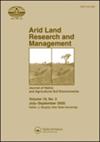Effect of biochar on potassium fractions and plant-available P, Fe, Zn, Mn and Cu concentrations of calcareous soils
IF 1.6
4区 农林科学
Q3 ENVIRONMENTAL SCIENCES
引用次数: 12
Abstract
Abstract Biochar as an eco-friendly substance, depending on its origin and production conditions, may have significant effects on soil properties, nutrient availability and K dynamics of arid and semi-arid soils. Biochars produced from wheat and corn residues, pyrolyzed at 250, 450 and 650 °C during 2, 4 and 8 h, were applied to four representative calcareous soils. First, 2 g of each biochar was added to 100 g of each soil and incubated under field capacity for 90 days. Then the soil samples were analyzed for soil properties, nutrient availability and K fractions. All biochars increased soil CEC, ECe and available K, P, Fe, Zn, Mn and Cu. The biochars produced at higher temperature had larger effect on soil properties, P and K availability, and smaller effect on Fe, Mn and Zn availability. The used biochars increased the amounts of soluble, exchangeable, non-exchangeable and HNO3-extractable K to 143–348, 316–605, 597–1,064 and 1,056–2,012 mg kg−1, respectively. The wheat biochar had larger effect on soil K than the corn biochar. Potassium saturation percentage increased with biochar application due to the larger effect of biochar on exchangeable K than CEC. The biochars increased the percentage of soluble K due to the limited capacity of exchange sites and clay interlayers for K adsorption. Biochar had different effect on the experimental soils; and the content of soluble K in the coarse-textured soils after biochar application increased more, than other K fractions. It was concluded that biochars, particularly the wheat biochar produced at higher temperature, have potential for improving K management of K depleted soils.生物炭对钙质土壤钾组分和植物有效磷、铁、锌、锰、铜浓度的影响
生物炭作为一种生态友好型物质,根据其来源和生产条件的不同,可能对干旱和半干旱土壤的土壤性质、养分有效性和钾动态产生显著影响。以小麦和玉米残渣为原料,分别在250、450和650℃下热解2、4和8 h,将生物炭应用于4种具有代表性的钙质土壤。首先,将每种生物炭各2 g加入每种土壤100 g中,在田间容量下培养90天。然后对土壤样品进行土壤性质、养分有效性和钾组分分析。所有生物炭均能提高土壤CEC、ECe和速效钾、磷、铁、锌、锰和铜。高温生物炭对土壤性质、磷、钾有效性的影响较大,对铁、锰、锌有效性的影响较小。使用生物炭后,可溶、可交换、不可交换和hno3可萃取K的含量分别达到143 ~ 348、316 ~ 605、597 ~ 1064和1056 ~ 2012 mg kg−1。小麦生物炭对土壤钾的影响大于玉米生物炭。施用生物炭提高了钾饱和率,这是由于生物炭对可交换K的影响大于CEC。由于交换位点和粘土层对钾的吸附能力有限,生物炭提高了可溶性钾的百分比。生物炭对试验土壤有不同的影响;施用生物炭后,粗质土壤中可溶性钾含量比其他钾组分增加更多。综上所述,生物炭,特别是高温下生产的小麦生物炭,具有改善缺钾土壤钾管理的潜力。
本文章由计算机程序翻译,如有差异,请以英文原文为准。
求助全文
约1分钟内获得全文
求助全文
来源期刊

Arid Land Research and Management
环境科学-环境科学
CiteScore
3.80
自引率
7.10%
发文量
23
审稿时长
9 months
期刊介绍:
Arid Land Research and Management, a cooperating journal of the International Union of Soil Sciences , is a common outlet and a valuable source of information for fundamental and applied research on soils affected by aridity. This journal covers land ecology, including flora and fauna, as well as soil chemistry, biology, physics, and other edaphic aspects. The journal emphasizes recovery of degraded lands and practical, appropriate uses of soils. Reports of biotechnological applications to land use and recovery are included. Full papers and short notes, as well as review articles and book and meeting reviews are published.
 求助内容:
求助内容: 应助结果提醒方式:
应助结果提醒方式:


